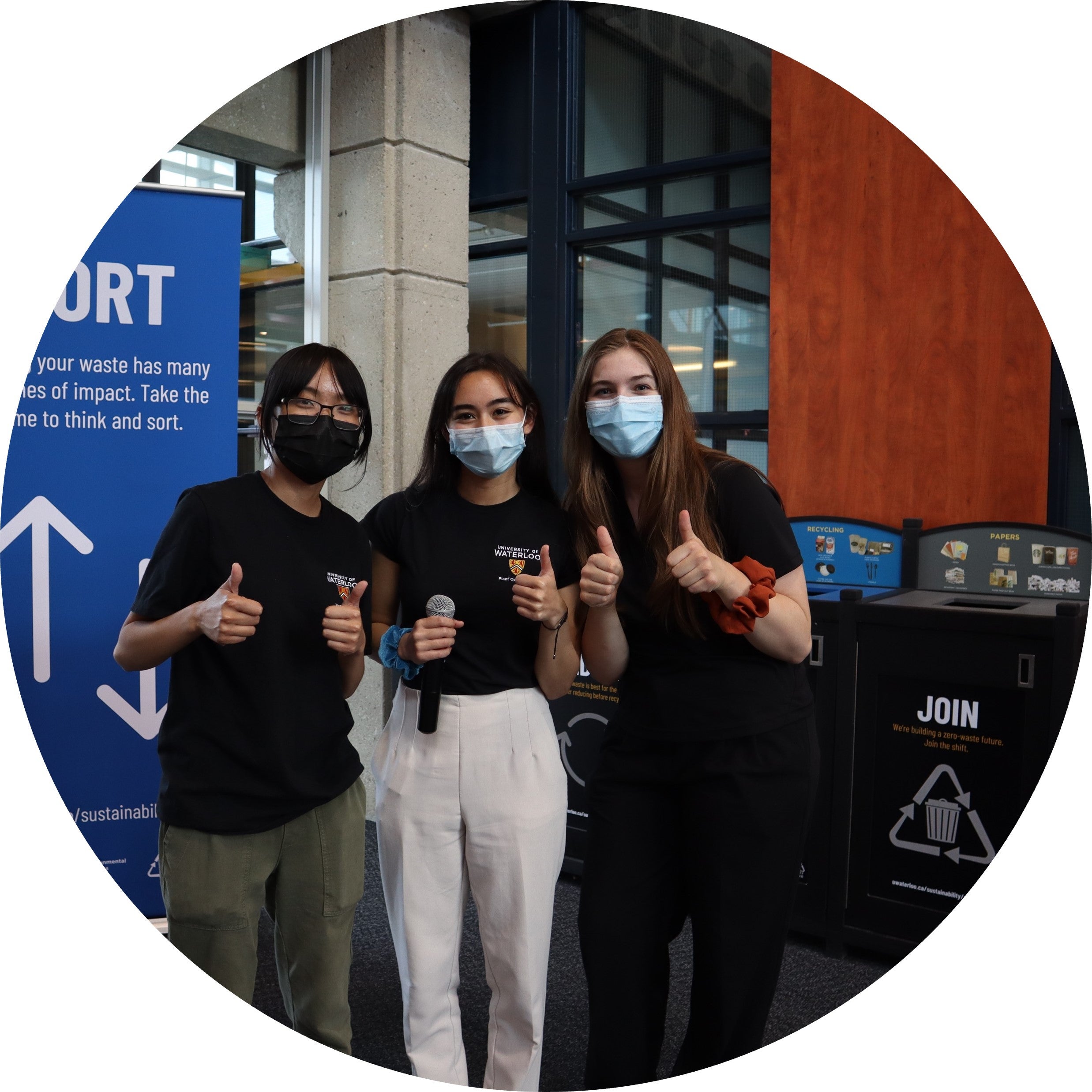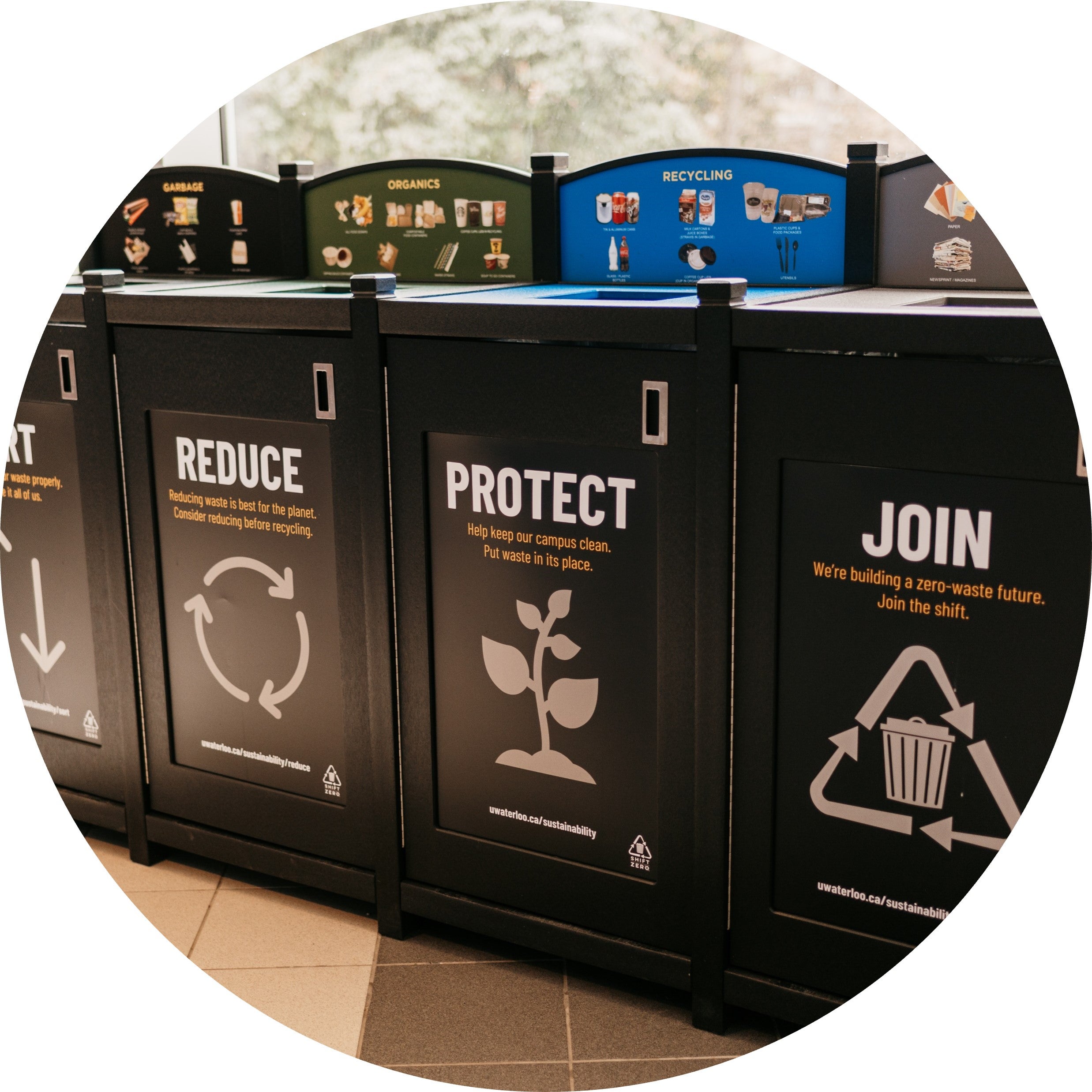Students turned staff members focus on supporting the campus community by providing resources on how to better sort your waste on campus. This article explores their experiences as starting as coop students and creating real impact on campus.
1. Tell us about yourself

Stephanie: I just finished my 3A term of Geography and Environmental Management here at the University of Waterloo. I found this position through WaterlooWorks and I started working with Environmental Services within Plant Operations in Fall 2021. This is my second co-op term with the department, and my current position is Operations and Marketing Coordinator! In my first term, I was focused on marketing and outreach, but also assisted with day-to-day operations, and ongoing projects like the new Shift: Zero Waste Sorting Guide and PPE recycling pilot. I had previous experience with graphic design and video editing, so I was tasked with creating promotional materials like videos and signage to promote our zero-waste goals!
Nathalie: My name’s Nathalie, I’m an avid nature and portrait photographer, downhill skier, and swimmer. I recently graduated from the University of Waterloo’s School of Environment, Resources and Sustainability (SERS) where my studies focused heavily on waste management. My undergraduate thesis explored waste diversion rates at Canadian Higher Education Institutions (HEIs) where I discovered that many institutions are facing similar challenges where it comes to waste management, regardless of how high their diversion rates were. I became involved in waste management after my first co-op position working for MASS Environmental Services, a waste management company based out of Cobourg, Ontario. For my subsequent co-op terms, I worked for the University of Waterloo’s Environmental Services section of Plant Operations coordinating waste diversion initiatives across campus. I’ve since transitioned to a full-time position at Plant Operations.
2. Why are you interested in sustainability?
Stephanie: When I was younger, I was always interested in geography and history and was vaguely interested in the environment from what we learned at school. I ended up in the Faculty of Environment because the program itself was interesting and I heard good things about the co-op program. However, since I started at the University of Waterloo, I feel like my interest in environmental issues has only increased as I learned more about the multidisciplinary, all-encompassing nature of sustainability. I don’t think there was one single experience or person who made me interested in sustainability, although in school, the environment and climate change were always a recurring topic in my consciousness. Honestly, if it wasn’t for my parents giving me a lot of books to read as a kid, I probably wouldn’t have become so interested in learning more about the planet and in turn all the human and natural systems which pertain to it.
Nathalie: I don’t remember a time when I wasn’t interested in sustainability but working at MASS was the turning point for my interest in waste management. When my to-be supervisor Heather Brown interviewed me for my position, I remember her enthusiasm towards waste management and thinking to myself; “there’s no way anyone can be this excited about garbage. "Well fast-forward three years, I’ve become somewhat of a waste enthusiast myself. I’m passionate about educating our community on waste reduction improvements we can make in both our personal and professional lives.
3. Tell us how you've been involved in sustainability on campus/community etc. What made you want to get involved?
Stephanie: Our department works hard to provide sustainable solutions for campus waste management. For example, we’ve recently created the new Shift: Zero Sorting Guide, Sorting App and Sorting Game with support from the Sustainability Office. The Shift: Zero Sorting Guide is a comprehensive waste sorting webtool for all of the University’s campuses including our Stratford campus. I have also created various signage and physical promotional materials to promote the Shift: Zero campaign, which is the University’s zero waste campaign. I wanted to get involved because our campus is so huge, helping people change their habits even slightly can make a difference in our environmental impact.
Nathalie: After my first co-op with MASS, I came back to campus with many ideas on how the University could make overall improvements to their current waste systems and diversion strategies. At that time, the organics program was just starting out, and the new multi-stream receptacles had only been implemented in the outdoor locations. Since being hired in 2019, I’ve helped with the retrofit of the new multi-stream receptacles and waste sorting signage, coordinated over 30 presentations to staff, faculty, and students regarding the University’s waste diversion efforts, helped with the continued rollout of the organics program, assisted with the yearly campus waste audits, and have spent lots of time researching new diversion programs which led to the implementation of the Shift:Zero Sorting Guide and the PPE recycling pilot in select health buildings on campus. Once I saw the positive impact, I was able to make on campus, I wanted to continue my position throughout my co-ops and secure a full-time position in waste diversion efforts post-graduation.
4. What was a memorable project or experience related to sustainability that you feel can or does have an impact on yourself or department?

Stephanie: Working for Environmental Services, I was given the opportunity to start a new video series for our department covering our waste initiatives and zero-waste goals. A lot of work that we do goes unseen by the community, so I wanted to properly highlight all the great work we do! I also helped lead the creation of the new Shift: Zero Sorting Guide, a new comprehensive waste sorting guide for campus. A need for such a tool arose since waste sorting rules are different on-campus versus off-campus, and we aim to make sorting easier and more accessible. We can collect user sorting data, so we are excited to use this data to improve our services and better target our messaging.
Nathalie: A recent project that we’ve been working on is the PPE recycling pilot in select health buildings on campus (Optometry, Health Services, Pharmacy, and IHB). My 3B work term report focused on the increased usage of single-use materials on campus in response to the COVID-19 pandemic. After learning about the extreme increase in PPE usage, I began researching specialized recycling programs that would help to divert these materials. With help from the Sustainability Office, and funding from the Sustainability Action fund, we were able to launch a PPE Recycling pilot through LifeCycle’s Revive program. We are currently determining the long-term feasibility and success of the program. This has had a positive impact within the health buildings on campus since we’ve been able to divert the PPE to recycling rather than sending it to landfill.
5. What advice would you give someone starting out who’s interested in sustainability but who is not in a sustainability focused job position?
Stephanie: I believe that you don’t need a degree in environmental studies, nor do you need an “environmental” job title to make a difference in sustainability. In fact, a diverse background can help provide different perspectives when it comes to implementing sustainability in the workplace. I’ve met people from all walks of life in the field, and I think we can greatly benefit from more people caring and contributing to a culture of sustainability. My advice is just going for it!
Nathalie: There are small changes that can be implemented at your workplace to promote sustainability. For example, you could change the margins on the printer to use less paper or post a sticker above the light switch to remind others to turn off the lights when they leave the room. Although, if you are interested in dedicating your career towards sustainability, gaining experiences in your own time will help to make you more qualified. Some examples of what you can do include: pursuing a Diploma in Sustainability (this is a great option for anyone not in a sustainability-focused major), volunteering at local sustainable non-profits to gain hands-on experience, and lastly, you can learn about sustainability through external resources such as LinkedIn Learning (all University students have access to this resource).
Interested in being a part of our new blog series? Email us at sustainability@uwaterloo.ca.